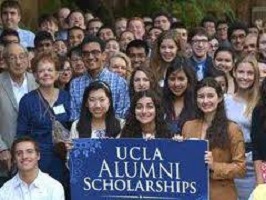Table of Contents
GLOBAL KOREA SCHOLARSHIP 2022
The highly competitive Global Korea Scholarship is now open for applications. The GKS 2022 was previously known as KGSP Korean Government Scholarship Program.
The KGSP 2022 will select 1270 international students from 155 countries who want to who wish to pursue a graduate-level degree (master’s or doctoral) or research in Korea.
Global Korea Scholarship is designed to provide international students with opportunities to study at higher educational institutions in Korea for graduate-level degrees, which will enhance international education exchange and deepen mutual friendship between Korea and participating countries.
As Korean Government Scholarship Programs have been integrated and branded as Global Korea Scholarship in 2010, the name is changed to GKS (Global Korea Scholarship).
The 2022 Global Korea Scholarship GKS is a fully-funded scholarship in South Korea and it will cover all the costs of the selected students. To be selected as a GKS (KGSP) grantee,
an applicant must successfully pass the 1st round of the selection process set by the Korean embassy where he or she holds citizenship or NIIED-designated Korean universities.
The South Korean Scholarship is one of the most competitive and top scholarship programs in the world. It is a similar scholarship program to the other fully funded international scholarships such as US Fulbright Scholarship, Chinese Government Scholarship, Australia Awards Scholarships, Turkey Burslari Scholarships, New Zealand Government Scholarship, and Daad Scholarship in Germany.
GLOBAL KOREA SCHOLARSHIP 2022 FULL DETAILS
HOST COUNTRY: South Korea
COURSE LEVEL: Master’s Degree Programs, Ph.D. Programs, Post-Doc, University Teacher/ Professionals Exchanges
FIELDS OF STUDY:
For more detailed information on majors (fields of study) offered by the universities listed above, refer to the “University Information” file attached under the GKS Notice post in our Study In Korea website (www. study in Korea.go.KR).
Applicants must choose their majors (fields of study) that are only listed in the “University Information” file.
Please be advised that even if a university’s departments or majors you intend to apply for offer English-taught courses, it may vary by lectures offered each term.
Thus, we highly advise you to double-check with your university. Furthermore, we would like applicants to keep in mind that Korean is the core language to be used in every Korean university.
Night School, Short-term seasonal programs, online and distant-learning programs are not available to apply and admission is not permitted.
SCHOLARSHIP DURATION:
- Doctoral Degree Program: 4 years (2020. 9. 1. ~ 2024. 8.31)
- 1 year of Korean language program
- 3 years of the regular degree program
- Master’s Degree Program: 3 years (2020. 9. 1. ~ 2023. 8. 31.)
- 1 year of the Korean language program
- 2 years of a degree program
- Research Program: 6 Months (2020. 9. 1. ~ 2021. 2.28.) / 1 year (2020.9. 1. ~ 2021.8.31.)
SCHOLARSHIP VALUE:
- Airfare (Return Air Ticket)
- Settlement Allowance: 200,000 KRW (offered once after entry to Korea)
- Monthly Allowance: (Degree Program) 900,000 KRW per month, (Research Program) 1,500,000
- KRW per month
ELIGIBILITY CRITERIA:
1. Nationality
- All applicants and their parents must not hold Korean citizenship.
- Korean citizens and dual citizenship holders (one who has Korean citizenship and citizenship of another country) are NOT eligible to apply.
- Applicants and their parents who had previously held Korean citizenship must submit the document that proves their renunciation of Korean citizenship.
- (※Exception: For overseas Korean applicants holding Japanese citizenship, if their parents hold ‘Permanent Residency Permit’ within Japan while holding Korean citizenship, are eligible to apply.)
2. Age
- Must be under 40 years of age as of September 1, 2020 (born after September 1, 1980)
- Academic professors who are under 45 years of age as of September 1, 2022 (born after September
- 1, 1975) and hold citizenship of one of the Official Development Assistance (ODA) recipients listed in the table below are eligible to apply
3. Degree Requirements
- Applicants must hold or must be expected to hold a Bachelor’s, Master’s, or Doctoral degree by August 31st, 2020.
- Doctoral Program Applicants: Must hold a Master’s degree or a level of education equivalent to a Master’s degree
- Master’s Program Applicants: Must hold a Bachelor’s degree or a level of education equivalent to a Bachelor’s degree
- Research Program Applicants: Must hold a degree or a level of education equivalent to or higher than a Master’s degree and must have received an invitation from one of NIIED’s designated Korean universities.
- Postdoctoral Research Program: Must hold a doctoral degree or a level of education equivalent to a doctoral degree.
- Professor Exchange Program: Must hold a Master’s degree or a level of education equivalent to or higher than a Master’s degree.
- Program for Education·Science·Culture·International Professionals: Must hold a Master’s
degree or a level of education equivalent to or higher than a Master’s degree. - Applicants who are expected to graduate at the time of applying must first submit the certificate of expected graduation at the time of applying. The official degree certificate (or diploma) and final academic transcript must be submitted by August 31st, 2020 at the very latest.
- In case an applicant fails to submit the above-mentioned document by August 31st, 2019 or
does not fulfill the grade requirement, the scholarship will be forfeited.
Prospective applicants who have attained a Bachelor’s, Master’s, or doctoral degree in Korea are
NOT eligible to apply. (※Exception: Overseas Korean Adoptees and GKS scholars)
Applicants who have previously studied in a Korean university as an exchange or visiting student can
apply to this program.
4. Grades
- Applicants must have maintained the overall grade point average (CGPA) equivalent to or higher than any ONE of the following from their respective universities:
2.64 on a 4.0 scale;
2.80 on a 4.3 scale;
2.91 on a 4.5 scale;
3.23 on a 5.0 scale; or - Score percentile: 80% or above (Exception: GKS scholars must hold the grade of 90% or above)
- Refer to Appendix A for the GPA Conversion table
- If an applicant has a CGPA below the minimum grade requirement, the applicant will be disqualified and the application will be disregarded.
- If an applicant holds a transcript that does not include information on grade point average or is
unable to convert his or her grades into any one of the GPA criteria mentioned above, then the applicant must submit an official document issued by the applicant’s university describing the university’s grade system.
5. Health
- All applicants must be in good health, both mentally and physically, to study in Korea for the full duration of degree or research programs.
- All applicants must submit Form 6 or the “Personal Medical Assessment” at the time of applying.
- All applicants who pass the 2nd round of selection must receive a comprehensive medical checkup and submit the certificate of health and medical examination result issued by a medical doctor or a licensed physician.
- If an applicant is found to be in one of the following conditions, the applicant will be disqualified in the final round of selection:
- An applicant is tested positive on drug tests;
- An applicant owns a serious illness that prevents him or her to study abroad for a long period of time including the full duration of a degree or research program in Korea.
PREFERENCE:
- Applicants who received outstanding scores for their proficiency in Korean or English may be given preference. Some examples include the followings:
Proficiency in Korean: TOPIK (Test of Proficiency in Korean)
Proficiency in English: TOEFL, TOEIC, or IELTS Academic (TOEFL ITPs are NOT acceptable) - Applicants who apply for majors in the field of Natural Science and Engineering are given priority
when they receive the same marks as other candidates. - Applicants who apply for majors under the Industrial Professionals Training Project are given priority when they receive the same marks as other candidates.
- Academic professors holding citizenship of developing countries, especially ODA recipients, are given priority when they receive the same marks as other candidates.
- Descendants of Korean War veterans will receive an additional 5% of the total marks.
- Applicants from low-income families or underprivileged backgrounds will be given preference.
- Applicants who are confirmed to be the „third-generation‟ or „post-third generation‟ overseas Koreans will be given preference
HOW TO APPLY FOR THE GLOBAL KOREA SCHOLARSHIP 2022?
You can apply in it only one of the two ways
Embassy track
- Applicants must choose THREE desired universities and available fields of study among 67 universities listed in section III.
Applicants that pass the 2nd round of selection will go through university admission in the 3rd round of selection (Refer to “4. Selection Procedure” below). - You will find the deadlines of applications for KGSP from the embassy of Korea in your country
University Track
- applicants must choose a major and ONE desired university among 64 universities.
- For the list of universities and fields of study that are available to apply, please refer to the
“University Information” file attached along with the GKS-G announcement post.
Study in New Zealand – Apply Now for the New Zealand Government Scholarship – Fully Funded
APPLICATION SCREENING AND EVALUATION:
Applications will be reviewed by each round’s selection committee.
Each selection committee will consider various factors when screening applications such as the following:
- Academic Transcript
- Personal Statement
- Statement of Purpose or Research Proposal
- Letters of recommendation
- Certificates of Language Proficiency (Korean or English), publications, awards, etc.
APPLICATION DEADLINE:
- The application deadline is set by each Korean embassy or university.
- All applicants must check the deadline of application submission by contacting their relevant embassy or desired university directly.
Application deadlines may differ from one country to another or by each university; it is expected to be around mid or late March. We highly advise you to make sure to check the calls for 2021 GKS applications separately announced by relevant institutions or offices.


